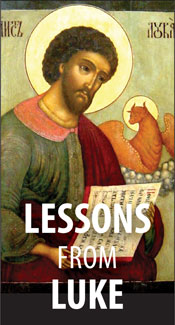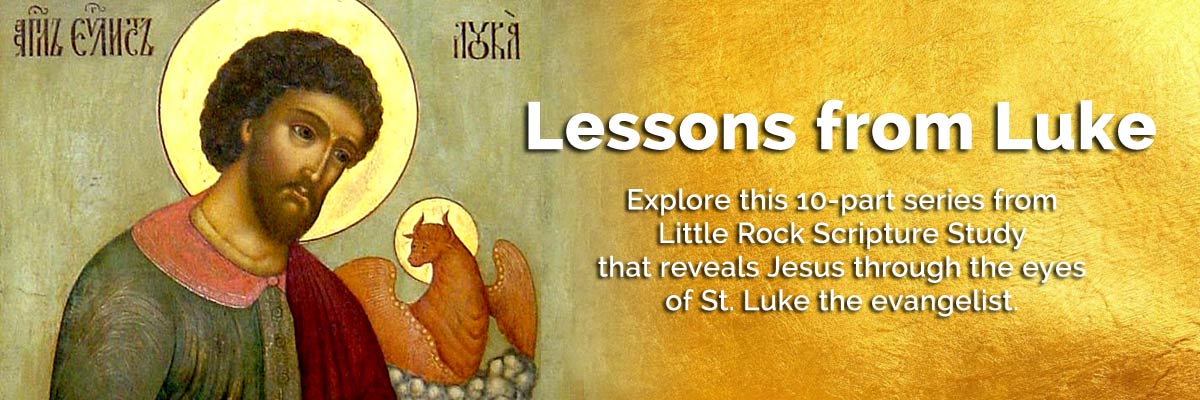Official Website of the
Catholic Diocese of Little Rock
God’s presence is known in relationships
Published: September 21, 2019
This is the eighth column in a 10-part series.
By Cackie Upchurch
Retired Director of Little Rock Scripture Study
Most of us are familiar with Jesus sending out his followers “two by two” as it says in Mark 6:7. While Luke’s Gospel does not use the same phrase in the passages where Jesus commissions his followers (Luke 9:1-6; 10:1-12), the image nonetheless sticks in our minds. Surely they strengthened one another in the task of proclaiming the kingdom and spreading the Good News that Jesus proclaimed and embodied. In Luke’s writings, pairs of people often appear even if not in the commissioning scenes. Simply begin at the start of the Gospel and turn the pages to discover Zechariah and Elizabeth, Mary and Joseph, Elizabeth and Mary, Simeon and Anna, John the Baptist and Jesus, Martha and Mary, Peter and Jesus, Jesus and Pilate, and the two disciples traveling to Emmaus.
In Luke’s writings, pairs of people often appear even if not in the commissioning scenes. Simply begin at the start of the Gospel and turn the pages to discover Zechariah and Elizabeth, Mary and Joseph, Elizabeth and Mary, Simeon and Anna, John the Baptist and Jesus, Martha and Mary, Peter and Jesus, Jesus and Pilate, and the two disciples traveling to Emmaus.
Luke’s second volume, Acts of the Apostles, also prizes pairings as we encounter Ananias and Sapphira, Philip and the Ethiopian eunuch, Saul and a different Ananias, Cornelius and Peter, Barnabas and Saul (Paul), and Paul and Timothy.
In all of these pairings, and in some that are less obvious, we find lessons about the importance of relationships, not just as an essential human connection but as an avenue of encounter with God who is with us.
In the context of human relationships of all kinds, we discover the value of shared joy and sorrow, the desire to grow in understanding, the need for ongoing conversion, and most importantly, we encounter Christ.
Just consider how significant it was for Mary and Elizabeth to lay eyes on one another during their unexpected pregnancies (Luke 1, esp. verses 39-45). Elizabeth was surely the object of gossip in her hometown, having gone so many years without bearing a child and then becoming pregnant well past her prime.
And some ten miles away, quite a distance in the ancient world, the young and pregnant Mary could easily have been the cause of scandal. Yet, in their meeting, there is sheer joy, giving testimony to the intervention of God in their lives, not just for their sakes, but for the sake of God’s people. Their children, John and Jesus, would change the world.
The early bond of joy between Elizabeth and Mary surely remained with them even as their sons matured and their preaching stirred up fear from powerful leaders, even leading to their executions. These two women are often depicted in later art and devotion rejoicing with newly pregnant women and their husbands, and giving comfort to those whose children are maligned, oppressed, or whose lives are lost.
A different lesson might be gleaned from the relationships between a follower of Jesus and a seeker. Examples may be found in the stories of Philip and the Ethiopian eunuch (Acts 8:26-40) and Peter and Cornelius (Acts 10).
In both instances the apostles, Philip and Peter, take advantage of circumstances that will bring them into conversation and listening with people they do not already know, individuals who are foreign to them. The moment of opportunity requires the apostles’ attentiveness, and the curiosity of the seekers provides an opening. In both instances, God manifests himself in a deeper understanding not just for the seeker but for the apostle.
Philip is able to share from his knowledge of Jewish sacred writing and in the process learns that God is being revealed to someone outside of his religious tradition. Peter is forced to respond to the needs of a Roman household where God has already arrived and poured out his Spirit.
Human beings are made for relationship, created to be in union with others. This truth was so obvious to the ancient Jewish writers that they told the story of creation with this truth at the core: humans are made in the image of God (Genesis 1 and 2), and God is all about relationship.
God communes with those who are his creatures, walking with them from the Garden of Eden, through the desert of Sinai, into the Promised Land, and to Babylon and back. The relationships between people formed along the way have the potential to reveal this divine intent. Ultimately, God sends his Son so that there will be no doubt that God chooses to be in relationship with human beings, even to the point of dying and rising.
Study Questions
- When has a relationship with someone in your family or with a friend helped you to grow in your love for God? Or grow in your understanding of how God is acting in your life?
- How is God’s continuing presence in the lives of the Jewish people a witness to God’s care for them? Are there Old Testament stories that help you to see this?
- What stories in the New Testament illustrate to you that God is powerfully present in human relationships?
- What opportunities have you taken advantage of to share your faith with someone over time as you’ve come to know them?
This article was originally published in Arkansas Catholic Sept. 21, 2019. Copyright Diocese of Little Rock. All rights reserved. This article may be copied or redistributed with acknowledgement and permission of the publisher.




